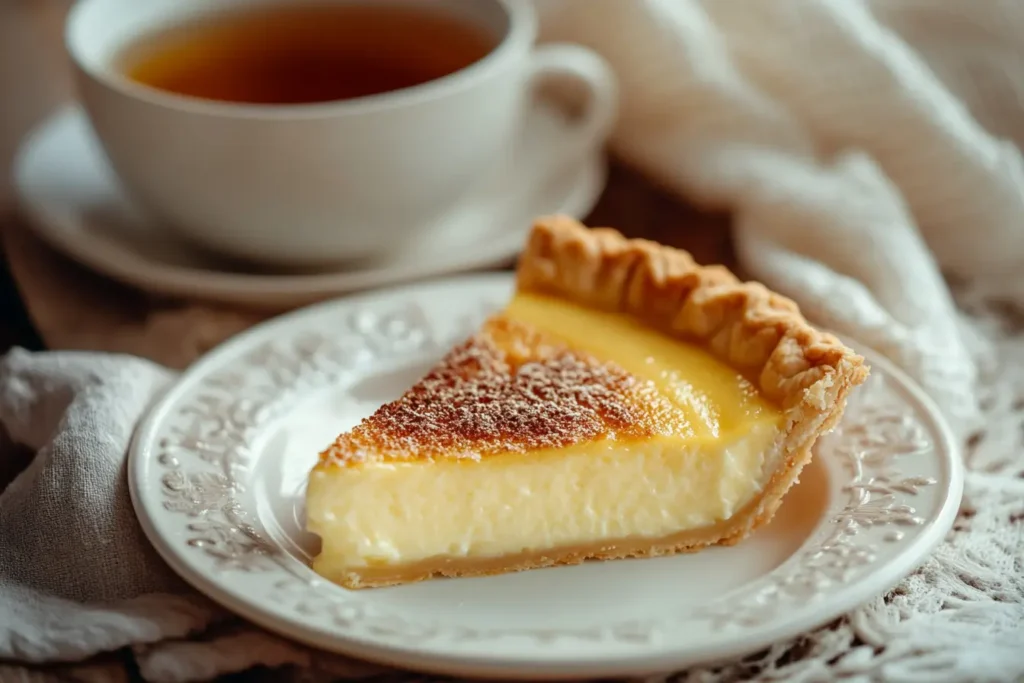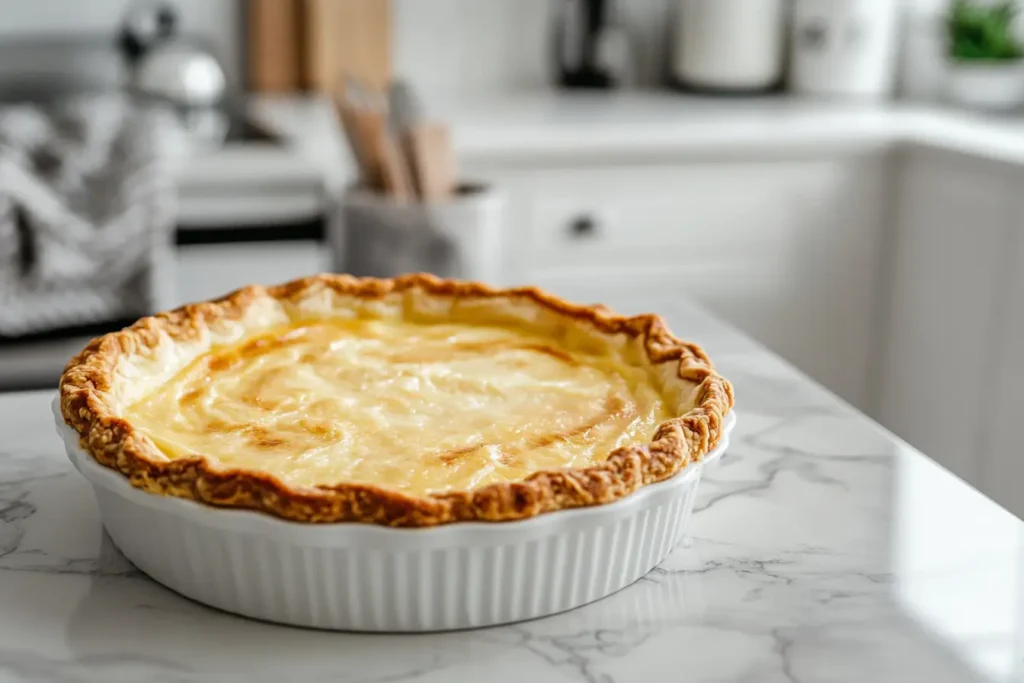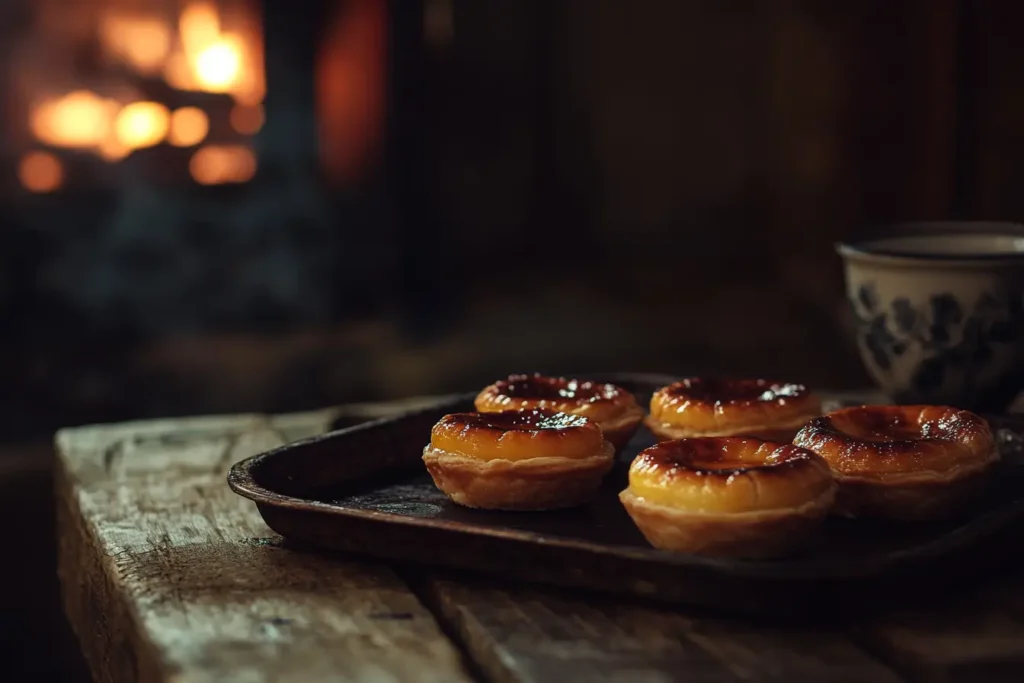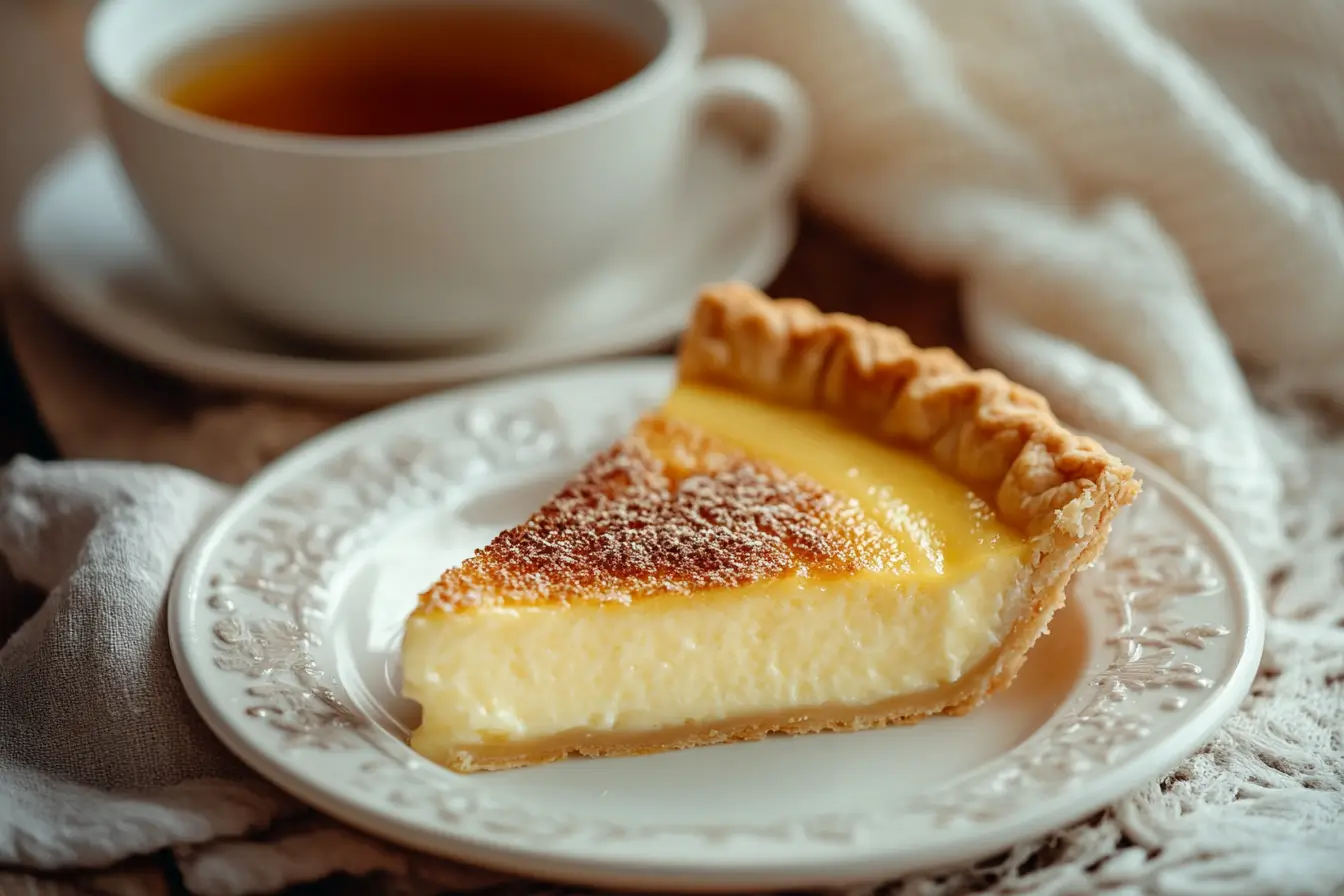
What Is Another Name for a Custard Pie?
Custard pie—just saying the name makes your mouth water, doesn’t it? But here’s the thing: this beloved dessert goes by more than one name. From flans to egg tarts, the humble custard pie has traveled the globe and picked up a whole host of aliases along the way. Today, we’re diving into everything you ever wanted to know about custard pie and uncovering its many delicious disguises.
So, grab a fork (or spoon), and let’s dig in! 🥧
Introduction to Custard Pies

Definition and Characteristics of Custard Pie
What exactly is a custard pie? At its heart, it’s a sweet treat made of a creamy custard filling nestled inside a flaky pastry crust. Custard itself is a simple combination of eggs, milk, sugar, and often a dash of vanilla or nutmeg for extra flavor. When baked together, the result is a silky, smooth filling that contrasts beautifully with the crispy crust. Think of it as the dessert version of yin and yang—soft and creamy meets crisp and flaky.
The Origins of Custard Pies
Believe it or not, custard pies have been around for centuries. This dessert is thought to have originated in Europe during the Middle Ages, where early versions were known as custard tarts. The concept spread across countries, adapting to local tastes and ingredients. Fun fact: custard pie was often considered a “fancy” dish, reserved for feasts and celebrations. Over time, it became a staple dessert worldwide.
Popular Names for Custard Pies
Egg Custard Pie
This is perhaps the most straightforward name for a custard pie, and it’s exactly what it sounds like—a pie filled with egg-based custard. Egg custard pies are popular in the United States and are often flavored with nutmeg or cinnamon. They’re simple, classic, and always a hit at family gatherings.
Flan: A Global Favorite
If you’ve heard of flan, you might be surprised to learn that it’s essentially a custard pie in disguise! Flan typically has a caramelized sugar layer on top, giving it a slightly different texture and flavor. It’s particularly popular in Spain, Latin America, and the Philippines, where it’s a must-have at celebrations.
“A flan is like a custard pie’s sophisticated cousin—smooth, caramelized, and always stealing the spotlight.”
Cream Pie and Its Variations
Did you know that cream pies are part of the custard family too? Take banana cream pie, for example—it’s a custard pie that gets an upgrade with sliced bananas and whipped cream on top. Variations like chocolate cream pie and coconut cream pie have also earned their place in dessert history.
Tart Variations: A Close Relative
Tarts are close cousins to pies, and many custard pies are considered tarts in some regions. For instance, the British custard tart is a beloved version that’s essentially a custard pie served in a shallower crust.
Regional Names and Variations

The British Custard Tart
In the UK, custard tarts are iconic. They’re typically baked with a sprinkle of nutmeg on top, giving them a warm, spicy aroma. You’ll often find them in bakeries or as part of a traditional afternoon tea spread.
Portuguese Pastel de Nata
Ah, the pastel de nata—Portugal’s gift to the dessert world. These bite-sized custard tarts are famous for their crispy, flaky pastry and creamy filling, caramelized on top for an added layer of flavor. If you’ve never tried one, you’re missing out!
Asian Variations: Egg Tarts in Hong Kong and Beyond
In Hong Kong, egg tarts are a cherished treat. These mini custard pies are a fusion of Portuguese and Chinese culinary traditions, often enjoyed with a cup of tea. The filling is slightly sweeter than Western versions, and the crust is usually buttery and crumbly.
“Every bite of an egg tart feels like a warm hug from a friend—comforting, familiar, and oh-so-satisfying.”
Ingredients and Techniques Used in Custard Pies
Traditional Ingredients: Eggs, Milk, and Sugar
Making a custard pie starts with the basics: eggs, milk, sugar, and sometimes cream. However, the ratio of these ingredients is crucial. For instance, if you use too many eggs, your custard will turn rubbery; on the other hand, too much milk might prevent it from setting properly. Therefore, achieving the right balance is key to a perfect custard pie.
Techniques for Perfecting the Custard Filling
The secret to a perfect custard is all in the technique. Slowly whisking the ingredients together helps avoid lumps, while baking the pie in a water bath ensures even cooking. Patience is key here—rushing the process could lead to cracks in your custard. And let’s be honest, no one wants a cracked pie.
Variations in Crust Styles
When it comes to crusts, there’s a world of options. Traditional shortcrust pastry is a classic choice, but some prefer a graham cracker crust for added sweetness. Want to experiment? Try a puff pastry base for a lighter, flakier texture.
Common Problems and Solutions When Making Custard Pies
Why Does the Custard Crack?
A cracked custard is every baker’s nightmare. This usually happens when the pie is overbaked or the oven temperature is too high. To avoid this, bake your pie slowly and keep an eye on the edges—they should be set while the center is still slightly jiggly.
How to Prevent a Soggy Crust?
Nobody likes a soggy bottom (pie, that is). To prevent this, blind bake your crust before adding the filling. This means pre-baking the crust with pie weights or dried beans to keep it from puffing up.
Tips for Avoiding Overbaking
Custards are delicate, so timing is everything. Remove the pie from the oven as soon as the edges are firm and the center has a slight wobble. It will continue to set as it cools.
The Cultural Significance of Custard Pies
Custard pies aren’t just desserts—they’re edible time capsules filled with history, emotion, and tradition. From their role in royal feasts to their spot on today’s family dinner tables, custard pies have evolved into more than just a treat. Let’s explore how they’ve woven themselves into the fabric of our lives.
Custard Pies in Celebrations and Festivals
Custard pies often make appearances during special occasions, and that’s no accident! Across cultures, they hold a special place as the centerpiece of celebrations. For example, pastel de nata is a holiday staple in Portugal, especially during Christmas. Meanwhile, in the United States, egg custard pie frequently shares the spotlight with pumpkin and pecan pies on Thanksgiving tables.
“Custard pies don’t just satisfy your sweet tooth—they bring people together, one slice at a time.”
Their versatility makes them perfect for any event. Need something fancy for a wedding? Serve up mini custard tarts. Hosting a casual potluck? A classic custard pie fits the bill. 🎉
Custard Pies in Popular Media and Literature
Believe it or not, custard pies have even made their mark in pop culture! You’ve probably seen them in classic comedy sketches—think slapstick routines where someone gets a pie to the face. While those pies are usually filled with whipped cream (not custard), the idea stems from the custard pie’s lighthearted, approachable nature.
Custard pies also appear in literature and movies as symbols of comfort and nostalgia. They’re the dessert equivalent of a warm blanket, reminding us of simpler, sweeter times.
Modern Twists on Custard Pies
While the classic custard pie will always hold a special place in our hearts, modern bakers and chefs have found ways to reinvent it. From bold new flavors to dietary-friendly options, today’s custard pies are as diverse as the people who love them.
Innovative Flavors: Chocolate, Pumpkin, and More
Why stick to vanilla when there’s a whole world of flavors to explore? Chocolate custard pie is a decadent spin on the classic, while pumpkin custard pie offers a seasonal twist that’s perfect for fall.
Feeling adventurous? If so, try tropical variations like coconut or mango custard pie. Additionally, if you’re a fan of spices, you can experiment with chai or cinnamon-infused custards for a warm and aromatic twist. Without a doubt, the possibilities are endless! 🌟
Vegan and Dairy-Free Custard Pie Alternatives
Gone are the days when dietary restrictions meant missing out on dessert. Today, there are plenty of vegan and dairy-free custard pie options that taste just as creamy and delicious as the original. Plant-based milks like almond, soy, and oat work beautifully in custards, and ingredients like silken tofu can mimic the texture of eggs.
“Being vegan doesn’t mean giving up dessert—it means discovering new ways to make it even better.”
These alternatives are also great for people with lactose intolerance or egg allergies, proving that custard pie is truly for everyone. 🥧✨
The Global Love for Custard Pies
Custard pies are more than just a dessert—they’re a universal language of love and indulgence. Across the globe, people have found unique ways to make custard pie their own, blending traditional recipes with local flavors and techniques.
How Custard Pies Unite Food Cultures
One of the most amazing things about custard pies is their ability to transcend borders. Whether it’s a British custard tart, a French flan, or a Filipino leche flan, these desserts share a common thread: the comforting combination of creamy custard and crisp crust.
Custard pies have even influenced fusion desserts, such as matcha-flavored tarts in Japan and dulce de leche custard pies in Latin America. Moreover, these creative twists highlight how versatile and beloved this dessert truly is. In fact, they’re proof that food has the power to connect us, no matter where we come from. 🌍
Famous Bakeries and Restaurants Known for Custard Pies
If you’re a custard pie lover (and honestly, who isn’t?), you’ll want to add these destinations to your travel bucket list:
- Pasteis de Belem, Lisbon, Portugal: Home to the iconic pastel de nata, this bakery has been serving its famous custard tarts since 1837.
- Lord Stow’s Bakery, Macau: Known for its Macau-style egg tarts, this spot is a must-visit for anyone traveling to Asia.
- Pie Lab, Greensboro, Alabama: This small-town bakery specializes in classic Southern custard pies, along with creative twists that’ll keep you coming back for more.
Planning a custard pie pilgrimage? Don’t forget to pack your stretchy pants. 😋
Pro Tips for Making the Perfect Custard Pie
Start with Fresh Ingredients
Using fresh eggs and high-quality milk or cream is essential for a perfect custard pie. Not only do these ingredients improve the flavor, but they also create a creamier and richer texture. Additionally, don’t skimp on vanilla extract—a little goes a long way in enhancing the overall flavor and making your custard truly shine. In summary, starting with top-notch ingredients sets the foundation for a delicious dessert.
Master the Water Bath Method
Baking your custard pie in a water bath is a crucial step because it helps keep the custard smooth and prevents cracking. To do this, place your pie dish inside a larger dish filled with hot water, ensuring even heat distribution throughout the baking process. As a result, the custard sets gently and evenly. Trust me, this step is absolutely worth it for achieving that perfectly silky texture.
Blind Bake Your Crust
No one wants a soggy crust! Blind baking involves pre-baking the crust with weights (like dried beans or pie weights) before adding the custard filling. This ensures your crust stays flaky and crisp.
“Blind baking is like giving your crust a head start—it keeps it golden and sturdy, even when loaded with creamy custard.”
Don’t Overbake the Custard
This one’s critical! Your custard pie is done when the edges are set, but the center is still slightly jiggly. Overbaking will result in a rubbery texture, and nobody wants that.
FAQs About Custard Pies
Let’s tackle some common questions you might have about custard pies! Bonus: I’ll guide you to helpful resources from Zeen Recipes for related tips and ideas.
What Are Some Other Egg-Based Pies Like Custard Pie?
If you’re exploring other eggy delights, you might enjoy quiches or savory breakfast pies. For more details, check out egg-based pies to discover both sweet and savory options.
Can Custard Pies Be Served for Breakfast?
Absolutely! Custard pies are versatile enough to be enjoyed any time of day. They pair beautifully with a morning coffee or tea. For creative ways to include pies in your morning, visit can you have pies for breakfast.
What’s the Difference Between a Custard Pie and Other Pies Like a Galette?
While custard pies focus on creamy, baked fillings, galettes are rustic and open-faced, with the crust folded over the edges. Learn more about the differences at difference between pie and galette.
How Do You Achieve the Perfect Crust for Custard Pies?
Want a crust that’s as memorable as the filling? Puff pastry can add an extra layer of texture and crispness. For inspiration, explore puff pastry dessert recipes for creative crust ideas.
The Art of Custard Pie: A Culinary Masterpiece
Custard pies are more than just dessert—they’re an art form. Achieving the perfect pie requires balancing textures, mastering techniques, and adding just the right touch of personal flair. But here’s the thing: you don’t need to be a professional baker to create something extraordinary. A little patience, some quality ingredients, and a touch of creativity go a long way.
Conclusion
There you have it—a complete guide to custard pies and their many delicious variations! Whether you’re sticking to the classic recipe or experimenting with vegan options, you’re now armed with the knowledge to make custard pies that will impress family, friends, and even yourself.
So, are you ready to start baking? The oven’s waiting, and your custard pie masterpiece is just a few steps away. 🥧✨

